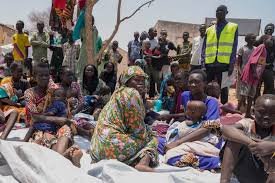As Sudan grapples with the complexities of internal conflict, the recent visit of Sudan’s Rapid Support Forces (RSF) leader to Ethiopia has brought the nation’s wartime struggles into sharp focus ([Insert link to Reuters article]). This conflict, marked by violence and political unrest, has not only led to a concerning loss of life but is also leaving an indelible impact on Sudan’s local economy and reverberating effects on the global stage.
Murder Statistics and Human Toll:
The war in Sudan has resulted in a staggering loss of life, with civilians bearing the brunt of the conflict. The RSF leader’s public wartime tour underscores the gravity of the situation. However, concrete murder statistics are often challenging to ascertain in the fog of war. The international community is confronted with the urgent need to address the human toll of this conflict and work towards a sustainable resolution.
Economic Fallout in Sudan:
The local economy in Sudan is facing severe challenges due to the ongoing conflict. Infrastructure, businesses, and livelihoods are disrupted, contributing to a decline in economic activity. The scars of war hinder agricultural production and impede the normal functioning of markets, exacerbating the economic hardship faced by Sudanese citizens. The economic fallout within Sudan has far-reaching implications for the nation’s development and stability.
Global Ramifications:
Sudan’s internal strife is not confined within its borders; it has global ramifications. The disruption of Sudan’s economy affects international trade partners, and the uncertainty created by the conflict can impact global markets. As a country navigates conflict, the potential for displacement of people and disruption in trade routes can lead to a ripple effect felt across borders.
Impact on the United States:
The conflict in Sudan has indirect consequences for the United States. As a global player, the U.S. may witness fluctuations in international markets, particularly if Sudan’s economic downturn affects global trade. Moreover, there may be implications for diplomatic relations and humanitarian efforts, as the international community grapples with how to address and resolve the conflict in Sudan.
In conclusion, Sudan’s war paints a grim picture of human suffering, economic hardship, and global interconnectedness. The statistics surrounding the loss of life underscore the urgency of international intervention and diplomacy. As Sudan faces its internal challenges, the world watches, recognizing the need for collaborative efforts to bring stability, peace, and economic recovery to a nation caught in the grip of conflict.









More Stories
POSSIBLE REASONS WHY YOUR HUSBAND DONT WANT TO HAVE SEX WITH YOU.
Secretly all small business owners hate Amazon! What if they closed tomorrow…
David Shands Illuminates Cleveland with a Trailblazing Entrepreneurial Event